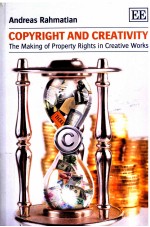

COPYRIGHT AND CREATIVITY THE MAKING OF PROPERTY RIGHTS IN CREATIVE WORKSPDF电子书下载
- 电子书积分:12 积分如何计算积分?
- 作 者:ANDREAS RAHMATIIAN
- 出 版 社:EDWARD ELGAR
- 出版年份:2011
- ISBN:1848442467
- 页数:314 页
1.Copyright as property 1
Ⅰ The legal concept of dematerialised property 1
1 The meanings of the term ‘property’ 3
2 The concept of ‘property right’ 5
3 The concept of ‘property object’ or ‘thing’ or ‘res’ in law 10
Ⅱ Copyright as a primary example of dematerialised property 12
1 The application of the concept of dematerialised property to copyright 13
2 The proprietarian Common law conception of copyright: protection against parasitical unfair competition and free-ride 35
3 The less proprietarian Civil law conception of author’s rights (droits d’auteur): protection of a person’s creation through personality protection 47
Ⅲ Conclusion 60
2.Copyright-property and the public domain: explanations and justifications 68
Ⅰ Historical-philosophical and economic explanations of property and copyright-property and their limited usefulness for modern copyright law 68
1 Explanations and justifications of property and copyright deriving from classical political philosophy 70
2 Economic explanations and justifications of property and copyright 91
Ⅱ A test of political-philosophical concepts: the idea of the public domain as a default position and starting point 97
1 Constructions of the ‘public domain’ 97
2 Another construction of the ‘public domain’ 109
3 A Kantian approach to the enforceability of viral contracts in the cyberspace 114
Ⅲ Conclusion: the value of philosophical justifications for modern copyright law and for the understanding of the public domain 118
3.The limitations to the powers of copyright ownership 123
Ⅰ Limitations as to conceptual extent 123
1 The idea-expression dichotomy 125
2 Copyright exceptions and limitations: restricted real rights in copyright? 137
Ⅱ Limitations as to time: term of protection 144
Ⅲ Conclusion 148
4.The attribution and allocation of copyright-property: authorship, creativity and ownership 149
Ⅰ ‘L’auteur est mort, vive le proprietaire!’ 149
1 The concept of the ‘romantic author’ and the anti-author movement in literary criticism and copyright theory 149
2 The exaggeration of the ‘romantic author-genius’ construct 156
3 The source of the ‘romantic author’ criticism - what Barthes and Foucault actually said: ‘death of the author’? 166
4 Legal concepts of authorship in copyright law and the relevance of postmodernist interpretations of authorship in legal reality 170
5 The implicit favouring of ownership over authorship in ‘anti-author’ conceptions 177
Ⅱ Creativity: the vexing fetish 182
1 Art and author’s creativity and their relationship to copyright: attempts at a description of creativity 182
2 Copyright and creativity: aporetic copyright rules 188
3 Authorship and originality/creativity in relation to restorations: ‘normative’ originality 194
4 The ‘creativity’ rhetoric of the creative industries 196
Ⅲ Conclusion 198
5.The effects of copyright-property Ⅰ: the problem of alienation 201
Ⅰ The legal preconditions for alienation Ⅰ: transfer of copyright 201
1 Assignments and licences 202
2 Works created by employees 208
Ⅱ The legal preconditions for alienation Ⅱ: security rights over copyright 213
Ⅲ The concept of alienation 215
1 Alienation according to Hegel and Marx 216
2 Karl Renner: change of social function behind the immutable legal institution of property and ownership 222
3 Copyright and alienation 225
Ⅳ The weaknesses of a moral rights protection system 237
1 The idea of moral rights: a remedy against alienation? 237
2 The impact of moral rights on the exercise of economic rights after their transfer 240
Ⅴ Conclusion 244
6.The effects of copyright-property Ⅱ: neo-feudal and neo-colonial features of international copyright protection 247
Ⅰ International copyright as a basis for neo-feudal and neo-colonial trends 247
Ⅱ The powers of copyright-property: property, sovereignty and feudal relations 249
1 Human expressions as property for power: the concept of the ‘product’ in business and marketing 249
2 The exploitation of copyright: employment, alienation and licensing as a kind of new feudal relationship 256
Ⅲ Neo-colonialism with the assistance of copyright 267
1 The classical legal distinction between property and sovereignty, and the reality 267
2 Copyright as a legal device for neo-colonialism 268
Ⅳ Conclusion 272Conclusions 274Bibliography 280
Index 303
- 《策划·推广·主持》(德)安德列亚斯·伦曾(Andreas Lenzen)著;徐世垣译 2004
- 《工业生物转化过程》(德)安吉斯·李斯(Andreas Liese),(德)卡斯滕·希尔贝克(Karsten Seelbach),(德)克里斯汀·温椎(Christian Wandrey)著;欧阳平凯,林章凛译 2005
- 《情遇尼采》(俄)露·莎乐美(Lou Andreas-Salome)著;王书祥,杨祖群译 2002
- 《金融领域中的伦理冲突》(英)安德里斯·R.普林多(Andreas R. Prindl),(英)比莫·普罗德安(Bimal Prodhan)主编;韦正翔译 2002
- 《鞋》(美)Linda OKeeffe著;(美)Andreas Bleckmann摄影 刘路译 2001
- 《Mixing of rubber compounds》Andreas Limper 2012
- 《OPEN EDI AND LAW IN EUROPE A REGULATORY FRAMEWORK》ANDREAS 1997
- 《Lecture Notes in Computer Science 3652:Research and Advanced Technology for Digital Libraries》Andreas Rauber 2005
- 《GLOBAL ENERGY GOVERNANCE:THE NEW RULES OF THE GAME》ANDREAS GOLDTHAU 2010
- 《CRIMES HARMS AND WRONGS ON THE PRINCIOLES OF CRIMIMALISATION》AP SIMESTER AND ANDREAS VON HIRSCH 2011
- 《The Elgar Companion to the Chicago School of Economics》Emmett 2010
- 《ELGAR》SIMON MUNDY 2222
- 《EDWARD ELGAR A CREATIVE LIFE》 2222
- 《THE ELGAR COMPANION TO PUBLIC CHOICE SECOND EDITION》MICHAEL REKSULAK LAURA RAZZOLINI WILLIAM F.SHUGHART II 2013
- 《THE CAMBRIDGE COMPANION TO ELGAR》DANIEL M GRIMLEY AND JULIAN BUSHTON 2004
- 《THE ELGAR COMPANION TO MARXIST ECONOMICS》BEN FINE 2012
- 《亚洲的减贫奇迹 成就斐然还是未竟之业?》(以)雅克·西尔伯;万广华编 2017
